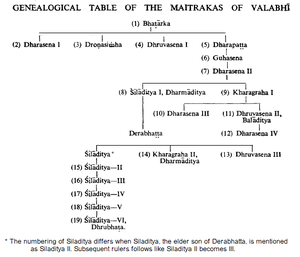Dhruvasena I
| Author:Laxman Burdak, IFS (R) |

Dhruvasena I (519 - 549 CE) (ध्रुवसेन प्रथम) was a king of Maitraka dynasty of Vallabhi, Gujarat.
History
Dhruvasena I was the third son of Bhatarka and the younger brother of Dronasimha. He reigned c. 519 - c. 549 CE. During his rule, Yashodharman of Malwa had defeated Harisena of the Vakataka dynasty, as well as the Huna king Mihirakula (in 528 CE). Dhruvasena probably had to acknowledge to overlord-ship of Yashodharman. It is known that they had regained their glory as Yashodharman's rule was short lived and was supplanted by the Guptas.[1]
In these grants, Dhruvasena's father Bhaṭárka and his elder brothers are described as 'great Máheśvaras' that are followers of Śiva, while Dhruvasena himself is called 'Paramabhágavata', the great Vaishṇava. He must be liberal in religious beliefs. In the 535 CE grant, he had made an arrangement for a Buddhist monastery at Valabhi built by his Buddhist niece Duḍḍá (or Lulá?). He had made several grants to Brahmanas of Vadnagar. The Jain council at Vallabhi was probably held during his rule which was arranged by his wife Chandralekha. During these days, he had lost his son as the Vallabhi council has condoled on loss.[2] Kalpa Sutra, the Jain text, was compiled probably during the reign of Dhruvasena, 980 or 993 years after the death (Nirvana) of Mahavira. Kalpa Sutra mentions that the public reading of it started at Anandapura (Vadnagar) to relieve Dhruvasena from the grief of the death of his son.[3] Based on his grants, it known that his kingdom extended from Dwarika to Valabhi, whole Saurashtra peninsula and as far as Vadnagar in the north.[4]
During his rule, the Garulakas or Garudakas had accepted the Maitrkas as their overlord. The Garulaka had captured Dwarika probably with help of the Maitrakas. They probably has an emblem of the Garuda and it his clear from their grants that they were Vaishnavas. They had made grants to Brahmanas and Buddhists alike.[5]
External links
References
Back to The Rulers